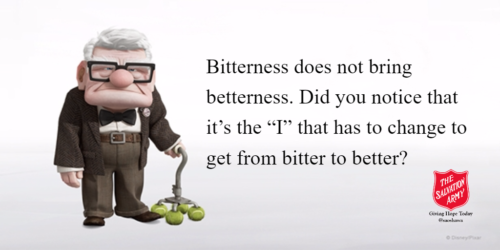There’s often a lot of pain and hurt behind the smiles in church lobbies and pews on Sunday mornings. If the things that haunt us were projected on a screen, we’d all be looking for a hole to crawl into. Maybe it’s lying or cheating on your income taxes. Perhaps it was a little thing, but it’s eating away at you, making you feel anxious, hurt, or depressed. The shoe might even be on the other foot. You feel you’re the one who’s the victim, and bitterness and resentment are knocking on the door.

Every one of us will suffer evil at some point in our lives. Some of us will have much more than our share of it. We live in a fallen world. And people, including Christians, do all kinds of strange and terrible things. People will lie to you. Somebody you trusted will gossip about you. The gossip might not be true, but it spreads like a poison, and you can’t stop it. A mother-in-law might interfere in your marriage. A roommate or a spouse might say something in anger that cuts so deeply it seems that the wound will never heal.
All of us have opportunities to cherish hatred or extend love. But you can’t afford the price you’re going to pay if you let that bitterness grow in your soul.
Bitterness is when you allow a hurt to become hate. When I was a kid and I had a cut or scratch mom would keep saying, “Don’t pick at it, Lindsay.” She knew picking at it would cause infection. But Lindsay didn’t always listen and that meant more radical treatment, a linseed meal poultice maybe. We do the same with our hurts, don’t we? We poke it, we stoke it, we feed it, we fan it and we stir up the flames to relive the pain of the hurt that came your way. It’s crazy but it hurts so good that we can’t let go of it. That’s what bitterness does. It hangs on to an offense, a hurt, and it grows into a monster.
Five Ways for Dealing with Bitterness
-
Don’t let bitterness build
The Bible says that God buries our sins in the deepest sea and doesn’t remember them anymore. He loves us so much, he chooses to forget. We can’t always forget because we don’t have that capacity. Love doesn’t keep a record of wrongs. And if we’re going to get along with people, the best way to overcome bitterness and resentment is to not let it happenRemember what Jesus said to Peter? “Seventy times seven.” In other words, forgiveness is to be the ongoing attitude our lives. Martin Luther King Jr said, “Forgiveness is not just an occasional act, it is a permanent attitude.” Don’t let bitterness and resentment build, forgive and move on.
-
Decide to forgive
The second thing we can do is to make a conscious decision to forgive. Harry Emerson Fosdick said that when he was a boy he overheard a conversation between his dad and mother at the breakfast table. He heard his dad say, “Tell Harry he can mow the grass today if he feels like it.” As his father left, he heard him call back, “Tell Harry he’d better feel like it.” Forgiveness is not a matter of whether you feel like it or not. It’s a matter of a command from your heavenly Father. “Forgive us our debts,” how, “as we also have forgiven our debtors” (Matthew 6:12). God says, “Forgive if you feel like it. By the way, you’d better feel like it.”
-
Take the initiative
A third thing we can do is take the initiative. Sometimes when we’ve been wounded, we sit back and wait and pray that the person who really hurt us will come and fall at our feet and beg for forgiveness. Then we’ll forgive them. But that seldom happens. Most of the time, if we are bitter or resentful, we have to decide to forgive and take the initiative.Matthew 18:15 says, “If your brother sins against you, go and show him his fault just between the two of you. If he listens to you, you have won your brother over.” Go tactfully, but take the initiative.
-
Release the Offender
Romans 12:19 “Do not take revenge, my friends, but leave room for God’s wrath, for it is written: ‘It is mine to avenge; I will repay,’ says the Lord.”When you begin to forgive, you say, “God, I turn this person over to you.” You’re not saying they didn’t hurt you or that you were in the wrong. You’re saying you’re not the judge or the executioner. You’re saying, “Lord, I’m going to trust any vengeance taken by you.” It’s not your assignment to make somebody pay.
-
Look to the future
Pay attention to the road ahead, not the road behind you. Believe that forgiveness is possible. Believe that through the power of the Holy Spirit working in your life forgiveness can take place.We find great comfort in knowing that our sins have been forgiven, thrown into the sea of Gods forgetfulness, his conscious will to forget. Are you willing to cast your hurts and pain, along with the infections of bitterness and resentment they have generated into the same sea?

Pay attention to the road ahead, not the road behind you. Share on X




